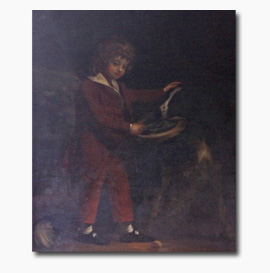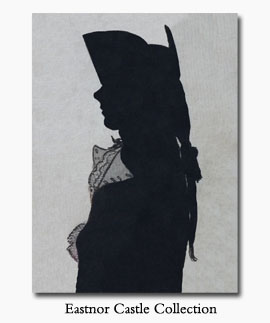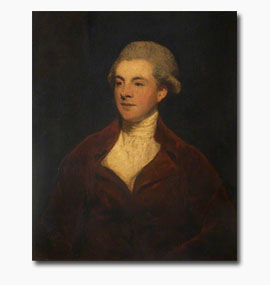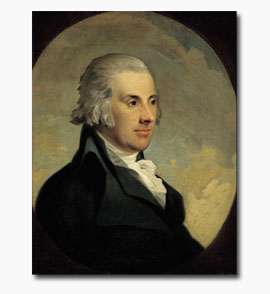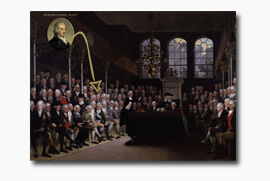Edward James Eliot: Results of a Broken Heart
Throughout his life, Edward James was a very active person. Content to remain in the shadows and leave the public light to others, he nonetheless kept very busy, performing many of the dull and non-rewarding tasks which were essential to so many causes. However, grief continued to wear away at him as lonely days passed into months which passed into years, and his health began to deteriorate. As a member of a family prone to "affectations" of one sort or another (usually internal or stomach complaints), Edward James' illness manifested itself as a painful "spasmodic affection of the stomach", brought on by "severe and continued grief [which] gradually impaired a constitution naturally strong". Without a doubt, his heart broke when Harriot died — and part of him died with her. It's so easily summed up in a biography with the classic sentence: "He died of a broken heart." A trite enough phrase to our ears, but it's different to see that sad state up close, particularly when it's drawn out over a long period of time. While not the most grammatical of writers, our hero had an amazing ability to transfer his innermost thoughts to paper. You come away from his letters with a clear picture of his mind at the time, and it seems unfair to make any attempt at re-wording his feelings. So, we will let him tell a bit of his own story by using as many direct quotes as possible. (All letters have been edited for easier reading, since the usual lack of punctuation makes things a bit difficult in many of the originals.)
Edward James' grief manifested itself most strongly each year on the anniversary of his wife's death, on which day he invariably composed a letter (into which he poured all of his sorrowful thoughts) to Mrs. Pretyman. Her own special friendship with Harriot had provided a particularly close link with the widower, and it was to her alone that he shared his innermost thoughts on the loneliness of his life. Occasionally, he felt himself to be conquering his feelings, even able to tell his friend that, "For myself — being, by God's help, freed from much of the depression & despondence which has hung upon me — I feel more at liberty to dwell upon the passages of that time in which only I have lived or can live here, and to be thankful for having been permitted to contribute to the satisfaction, however shortly, of the most perfect mind that was ever permitted to animate a human frame."
As the years went by, and his daughter grew older and more like in appearance to her "Beloved Mother", Edward James struggled afresh with his sorrow. On the fourth anniversary of his wife's death, he wrote from Burton Pynsent:
". . .I shall have to finish my journey something less dear than I might have had. I trust, however, no ideas of that sort will ever induce me to forget, tho' for an hour, the way I have to go, or the country I have to endeavour to arrive at, with hopes in the infinite Goodness of God of receiving that society forever which has been here broken and imperfect."
The most heartbreaking and vivid letter must certainly be the one written a year later, on the fifth anniversary. None of his sadness had really faded. Perhaps it was under control during his daily dealings, but time in one part of his memory had really stopped there in Downing Street in 1786. The following letter is dated 25 Sep 1791, and it should really be read in its entirety — showing a true picture of his grief and his spiritual walk. Without any normal preamble, the letter starts abruptly and to the point:
Having put off, My Dearest Madam, for some time (unintentionally) the thanking you for your last kind letter, I have, I confess, [latterly differed of purpose] to this day, the telling you that my sweet child continues (thank God) well and grows, I might say, truly more and more what I wish her – more and more like my own Harriot. In another year, I think I may intrust her with that history and make her, I hope, comprehend how much is required of her, when call'd by the name she owns and inherits, for the grace and unsullied beauty and purity of which, in her keeping, I feel most anxiously as well as deeply responsible. More so, I much fear, than I shall ever answer, if I may judge of the future by the past. I have been five years with but one thing to do, one way to go. And how slowly and unsteadily have I gone in it. Five years ago I saw Death in my chamber, at my right hand, nearer and more unexpectedly than I think it can ever come again. All my desires and wishes for this world, with supposed enjoyments, broke off at once. And could I have believed I should be now no more prepared, no better fitted, for the other – that is, my first duty – as it is my great wish at this moment, I hardly dare say hope. Were that object to any degree attain'd, I verily think I might cease to regret all that has pass'd. I should think, undoubtedly, I had lost to me all the whole world but saved what was more valuable, and changed (I might hope) a short interruption for an Everlasting. But that I am yet far from. Perhaps, indeed, it is a thing which we should not expect, which is reserved for Him in whom Knowledge stands over Eternal Life. But no more of this. Tho I may, on the occasion which I am now, as it were, commemorating, open the feelings of my heart at the moment to you, I need not dwell upon them. I will therefore conclude by saying that I go on acting my common part, something less unwillingly, with no more satisfaction to myself, I hope with somewhat more to others.
Mrs. Pretyman replied immediately, assuring him that her "cherished affection" for her dear departed friend was enough to make her "so far deserving" of the confidence he shared so openly in the letter above. She agreed with his feelings of grief, but as to those on his "first duty" (being his Christian walk), she did not agree — and stated so most decidedly:
With this consciousness, and under the impression of many Conversations with "your own Harriot" (which will ever live in my Memory), I feel bold enough to blame you for that depressed state of mind which, if indulged, must destroy that joy & peace in believing which our Religion is surely designed to produce. But, knowing as I do, from the best authority, that Humility was ever one of your characteristic virtues, I the less wonder that it should now a little exceed its bounds and lessen the comforts which properly belong to Faith in the Goodness of God and the Atonement of Christ.
She also assured her friend of his Heavenly prospect of seeing, once again, "her to whom I doubt not you will be reunited."
This habitual sadness was certain to wear down even the naturally strong constitution of our hero, and Rev. Pretyman remembered that only Edward James' "strong sense of religion led him to submit, with resignation, to the will of the Supreme Disposer of all events, and to exert himself in the discharge of the duties belonging to his station in life." His exertions were certainly many (despite his personal grief), found not only in his political duties but also involving the many matters of social and political reform discussed earlier.
The last decade of the 18th century was a tumultuous one for Britain, since the French Revolution meant that England was (once again) at war with her age-old enemy across the Channel. Fear of an invasion was ever growing in the minds of civilians and military men alike, but the Army and Navy were stretched almost to a breaking point on the battlefields. In order to protect their coast, defense funds were begun throughout the country — and everyone from farmers to noblemen contributed in their own way. Funds were also established to enlarge the extant Militia regiments, as well as raising regiments of "Fencibles" across the coast. These regiments were raised by individuals, with a committee for each county that controlled the actions of all regiments in their own county. When the men of Cornwall began meeting to discuss their first Fencibles regiments, Edward James was one of the gentlemen to assemble in London at the "Star and Garter" in March 1794. A year later, he was commissioned as a Captain in the Cornwall Regiment Fencible Cavalry (or Light Dragoons), and one year after that he was promoted to the rank of Major. This move came as quite a surprise to even his closest friends, with Wilberforce commenting that "he had entered from motives of patriotism, and greatly against the grain so far as comfort went." He was also very active in parliament on the subject of the Militia, chairing committees for different amendments to various acts regarding the augmentation of Militia on land and sea. With his illness and busy political schedule, it seems that there cannot have been a lot of time left to devote to his Fencible duties, but some time is sure to have been had during his times at Port Eliot. A sword still survives at the house which is most likely Edward James' Cavalry sword from this era!

After years of public service in private (or quiet) capacities, it was in 1797 that our hero's true character almost became "known to the world" at large. With such a heart for the salvation of India, Edward James was chosen by Pitt as the candidate for Governor-General of Fort William (a position later known as Governor General or Viceroy of India). This was one of the highest posts which the British government could bestow, and Edward James' appointment was approved by Dundas and backed by the Directors of the East India Company. Wilberforce and his other Clapham friends looked forward to the possibility of sending missionaries and Bibles into the country, but this was not God's plan for our hero. Just when the appointment was to be announced to the public, Edward James' stomach complaint turned to a serious illness, and he was forced to decline the position. Instead of "mounting the vice-regal throne and ruling swarthy millions", he was forced to move to Bath, in hopes that the waters there might bring about some relief. For a time, they did, and he was able to maintain some regular activity in the form of riding out each day between one and three o'clock. He stayed on there for at least two months, but it is here that evidence of his failing health became known to some of his friends. No letters came from him to Mrs. Pretyman after June, though she herself sent a number of anxious requests and enquiries. The last-known letter written by Edward James is one sent to Wilberforce (written on the 30th of August) in response to the news that Wilberforce's sister had just lost her husband.
"Your sister's resigned and composed state of mind must be a real consolation to you; her well-founded religious principles and habits must stand her in good stead. When a similar calamity befell me, I now think I was little better than an infidel; but it pleased God to sanctify His visitation, and gradually to draw me by it to a better mind. My present infirmity, I am well-nigh convinced, is sent upon the same errand: the necessity for it I sincerely submit to His wisdom, but the effects I certainly feel and willingly acknowledge to have been spiritually beneficial. My thoughts have been much more settled, less disposed to wander and to dwell upon the world or the enjoyments of sense, and my imagination much less uncontrollable than heretofore. For all this I am truly thankful, and though not quite free from the remains of my complaint, I do not pray to God to relieve me from them, if it is to be at the expense of these more substantial blessings. In the mean while, by His goodness I am free from any very considerable uneasiness; and if my service be to ‘stand and wait,' it is hitherto without pain, and I trust without impatience: after all, however, I do not mean to state myself as despairing of being restored to more exertion."*
While he certainly does not sound like he felt himself to be in his last few weeks on earth, his mind was right where it needed to be and his faith strengthening daily. Even Wilberforce found comfort in this letter (one of the few he actually saved) saying, "But I have the solid satisfaction of knowing that his mind was just in the state I should have wished, had I been aware of the awful change which awaited him. Peace be with him. May my last end be like his."
By September, Edward James was able to take his daughter to Port Eliot. His parents were there, as was his brother John. His youngest brother, William, was the only one missing from the happy cinch, as he was in the midst of finalizing a marriage settlement with his soon-to-be in-laws at Trentham House. Edward James appeared revived by this visit. Favourable news reached his many friends in London and all were hopeful of a recovery, but God had other plans, though, and — after several months of agonizing pain, Edward James passed on to his Heavenly home quite suddenly on the 17th day of September 1797 (just three days before his daughter's eleventh birthday.) Harriet Hester was with him at the end, as was his brother John and (presumably, since they were at home) his father and mother. Our hero had joined his beloved Harriot, and there is evidence that the family will have had their grief tempered by a profound resignation to the Divine Will of God.

<< Previous Page • E.J. Eliot Home Page • Next Page >>

*It is at this point that a short comment on Edward James' statement "when a similar calamity befell me, I now think I was little better than an infidel" would seem to be in order. Despite the implication of this statement, it does not necessarily mean that he was not a Christian before his dear Harriot's death. In fact, if those words had been read in the context of his Evangelicalism-influenced faith, anything short of the strictest adherence to spiritual discipline and practice would have seemed equivalent to unbelief. Having been so influenced by Wilberforce and Henry Thornton, there is no doubt that anything previous to his heart-felt piety after Harriot's passing would have seemed properly expressed by the phrase "little better than an infidel". He was most certainly raised in a devoutly Christian home, as evidenced by the faith of his Mother and paternal grandmother (a very strong believer and well-known to him for his first ten years). Another point can be made by a study of his brother, William, who possessed just such a strong faith. A faith which upheld him through the deaths of each of his four wives. It would seem more probable, then, that these men were brought up to a practical and meaningful Christian faith. Apparently, no letters of any kind survive from Edward James' mother, but letters written by William's mother-in-law, Lady Stafford, give a clear picture of her as a pious woman of undoubtable Christian faith and character. True Evangelicals (being Wilberforce and many of his friends) were a very strict and self-abasing group in their personal religion and relationship with God. They did not discount the practices of other Christian denominations, but they themselves held to a very serious and all-encompassing faith which affected every waking moment of their lives. Under this pretext, they judged their own actions and thoughts rigorously (often harshly, one might say) in a fashion not easily understood by outsiders. God raised up this group at this certain time in history, and the people He brought to this way of thinking suited it — as it suited their lives and work. Broad and self-abasing expressions like "little better than an infidel" are common-type statements in the writings of this crowd. These reflected the true humility of the characters (which is certainly not the common definition of humility as used today). This is illustrated perhaps best by the account of Wilberforce's last hours, when — reviving for a moment — he whispered to his son, "I am in a very distressed state." His son responded with the comforting statement of "Yes, but you have your feet on the Rock." With a characteristic humble reply, Wilberforce responded by saying, "I do not venture to speak so positively, but I hope I have." Of course, no one doubts Wilberforce's faith. In this same vein, it's probably that Edward James was a Christian before Harriot's death, even if he may not have been a very devout one. Certainly, it was after her death that his faith became the center of his life and grew to the point of enviable submission as exhibited in the aforementioned extract.


